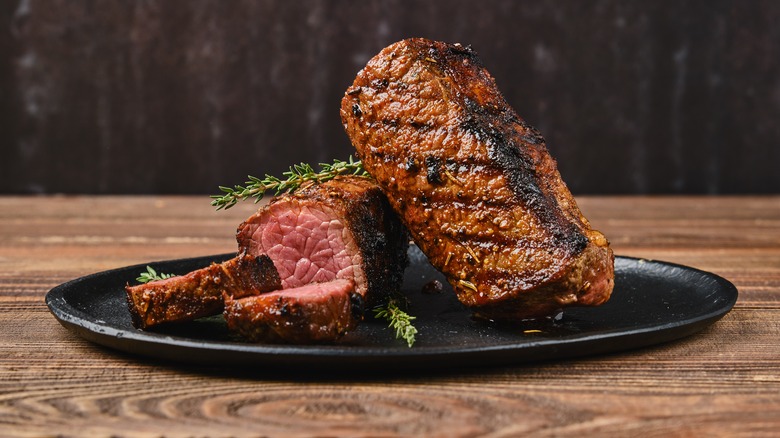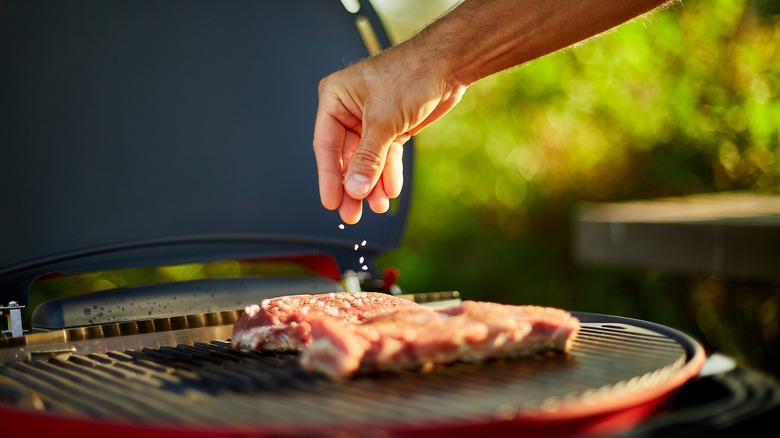Table Salt Is A Lackluster Choice For Seasoning Steaks
It is common culinary wisdom that you should only season steaks with salt. There are exceptions, of course. Tough cuts may require a tenderizing steak marinade, but for the best cuts of steak, a generous sprinkling of salt is all you need to make the most of that rich, beefy flavor. Salt does so much more than make food salty, especially regarding meat. Salting your steak will help it retain moisture for maximum juiciness in every bite, and salt can enhance umami, the rich, nutty taste that defines a high-quality piece of beef. Seasoning with salt should always be your first step when cooking a steak.
When you think of salt, your first inclination is probably to reach for the shaker on your table, but this would be a mistake when it comes to seasoning steaks. Although it is the most common type of salt, table salt is a lackluster choice in the kitchen, and very few professional chefs would recommend you ever use it. Every feature of table salt, from its flavor to the size of its grains, is a poor match for steak. Luckily, a much better option is available, and you won't have to go out of your way or spend big money to get it.
The trouble with table salt
Table salt, also known as granulated salt, is the standard choice for filling salt shakers worldwide. Unfortunately, it is heavily processed, presenting some serious issues in the kitchen. To make table salt, producers take salt from underground mines and wash it to remove trace minerals. This produces a saltwater solution, which is then dried in specially designed containers to produce fine, uniform cubes. That's a problem when it comes to seasoning steaks, as the fine grains can be difficult to sprinkle evenly with your fingers.
The biggest issue with table salt is its flavor. For starters, it's the densest type of salt, coming in at 19 grams per tablespoon. Compare that to sea salt and kosher salt, which typically come in between 10 and 15 grams per tablespoon, and you'll see that table salt imparts much more salty flavor on a per volume basis. On top of this, table salt contains iodine and anti-caking agents. Iodine is a necessary nutrient, but you can get it from many other foods including fish, dairy, and produce, and this is preferable because adding iodine to salt gives it a harsh metallic flavor. Seasoning steaks with table salt can overwhelm the natural beef flavor with salty and metallic notes, ruining the nice meat you invested in.
What to season steaks with instead of table salt
Even though you shouldn't salt your steaks with table salt, you need to salt them with something. When you salt the steak ahead of cooking it, the salt draws moisture from the muscle to the surface of the meat, which will then be reabsorbed, drawing the salt into the depths of the steak and locking in the juices (make sure you salt steak at the right time to get a satisfying crust). Fortunately, the best type of salt for seasoning steaks is almost as common as table salt. It's kosher salt, which you should be able to find at any grocery store. Professional chefs widely regard it as the premier salt for all culinary purposes, not just seasoning steaks.
Kosher salt is pure sodium chloride. It doesn't contain the anti-caking agents that table salt does, and it is typically not iodized, meaning you won't get any unpleasant metallic flavor leaching into your steak. Kosher salt is a little more than half as dense as table salt, ranging from 10 to 15 grams per tablespoon, which means that it also has a less aggressively salty flavor. Lastly, kosher salt's medium-sized, coarse grains are easy to pinch and sprinkle in an even layer across your steak, giving you optimal control over your level of seasoning.


